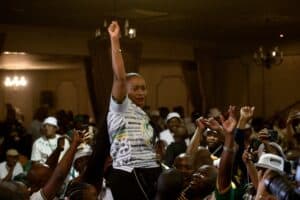Thandiswa Mazwai's music often has social and political commentary

On Tuesday, President Cyril Ramaphosa announced the date and names of those invited to the national dialogue, where some of the country’s pressing issues will be discussed.
“There have been many of these over the years, and I have attended some,” Thandiswa Mazwai tells The Citizen.
The renowned singer-songwriter says she wasn’t invited by Ramaphosa, but says she would’ve accepted the invitation had it come.
“There is much to be legislated in our industry and much to be done to protect artist rights, livelihoods and dignity,” shared Thandiswa.
ALSO READ: Ready to dazzle: Afro-soul singer Thandiswa Mazwai releases ‘Sankofa’ album
Singing truth to power
In the art and creative space, the president invited elders Dr John Kani and author and poet Gcina Mhlope.
The dialogue has drawn mixed reactions throughout the country, with the Economic Freedom Fighters (EFF) describing it as a “meaningless publicity stunt by a limping president who is leading a limping former liberation movement”.
Through her music, Mazwai has provided social and political commentary, often targeting those in power.
Her song, Kunzima: dark side of the rainbow, is a perfect example of her sharp melodic criticism.
“Fools for leaders, their minds left destitute by greed, no souls to speak of, they cannot be redeemed, fiends for war…” Thandiswa sings on the song.
The politically charged song is part of Thandiswa’s Sankofa album, which was released just over a year ago.
Thandiswa spoke to The Citizen ahead of her performance at the Lyric Theatre at Johannesburg’s Gold Reef City, where she will celebrate a year of Sanfoka, on June 29.
“This show will exclusively cover the music from Belede and Sankofa,” she shares.
ALSO READ: ‘I cannot believe it’s been 20 years’ – Thandiswa Mazwai on new album and 20 years of ‘Zabalaza’
A year of Sankofa
Sankofa was released on 10 May 2024. Before its release, Thandiswa had last released a body of work in 2016 with Belede.
Despite the long break between her albums, during which the world had changed, Thandiswa said she wasn’t nervous about how her music would be received.
“Not at all,” she says.
“Even though I haven’t released new music, I have been performing a lot, and the audience has been getting exposed to all the things I experiment with. Especially Jozi audiences, who can sometimes get impromptu rock performances or a set with a DJ.”
She says the release of Zabalaza in 2004 taught her that people can grow with her sonically.
“Sankofa is a very layered and lush album, and I know there is an audience for that. It has also been very masterfully put together by all the musicians who were involved.”
The word sankofa is derived from the Akan Tribe of Ghana, which can be translated into “go back and get it”.
The essence of the meaning symbolises going back in order to move forward.
This was somewhat literal for Thandiswa, as she delved into the International Library of African Music (ILAM) at Rhodes University, an archive of African sounds.
The launch of the album at Carnival City’s Big Top Arena last year was more than a musical experience; it also offered itself as a safe space for black women in particular.
Thandiswa’s concerts inevitably become a place of healing, love and a safe space for her core fans – a significant part of that fandom is the queer community.
She preceded the performance of her latest single, Kulungil, by sharing a bit about her past traumas − her backdrop was an old photo of a young Thandiswa in the rural Eastern Cape.
She even revealed that on the day the photo was taken, she had experienced something traumatic. It was more than just a music show for black women. It was a safe space for them to be.
Her performances at last year’s Bushfire Festival and the Standard Bank Joy of Jazz were equally appreciated by a more diverse demographic.
“We have really enjoyed playing this music along with the rest of the discography around the world. It’s always such a trip watching people sing new music back to you,” says Thandiswa with gratitude.
ALSO READ: Collaborative Wouter Kellerman bags Grammy nomination as Thandiswa’s ‘Sankofa’ misses out
Awards and such
Sankofa lost out on a Grammy nomination and also failed to win at the Metro Awards, where it was nominated in the Best Jazz category.
“I don’t usually win awards,” Thandiswa says.
“I’m experimental, and awards require very constant ideas on what constitutes genre. For instance, Sankofa was nominated in the jazz category, but it really isn’t jazz. It is a sound all on its own, and it definitely has jazz influences, but it also has deep Xhosa and Senegalese influences.”
The Metro Award went to saxophonist and composer Linda Sikhakhane for iLandi, whom Thandiswa congratulated.
The Grammy nomination, which saw Mzansi’s Wouter Kellerman nominated and eventually win, is a lot trickier, where Academy members vote for entries in two rounds.
“This was our first attempt, and we enjoyed the experience, but I am acutely aware of the fact that we don’t need these awards for validation,” she shares.
“So as long as it’s all good fun and not a bar to measure our worth, it’s all good.”
Thandiswa has a wide range of fans, from the youthful ones who were aware of her performance on Tiny Desk and cheered her on, to the more senior ones who aren’t able to navigate YouTube.
“It feels good to be seen. It feels good to be appreciated. It feels good to be affirmed and reminded that you are indeed doing what you were called to do.”
NOW READ: Thandiswa Mazwai creates a safe space for black women at Carnival City






